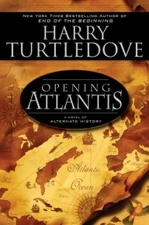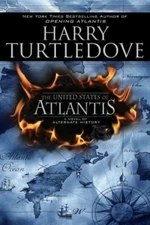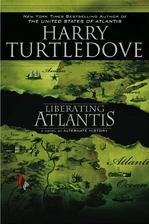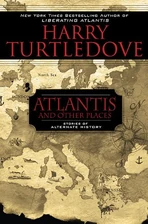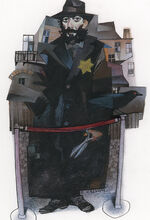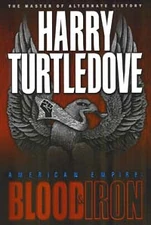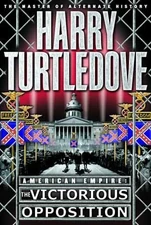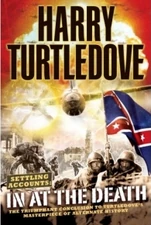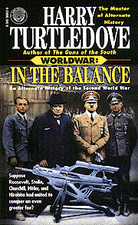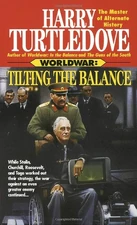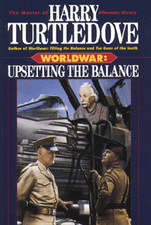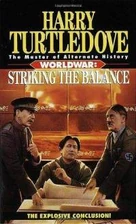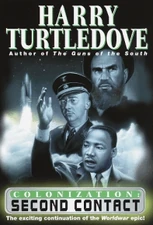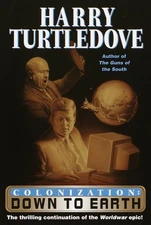| Federative Republic of Brazil | |
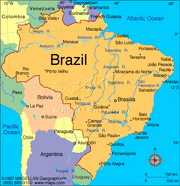
| |
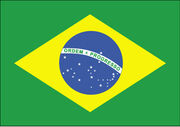
| |
| Country | |
| Continent: | South America |
| Capital: | Brasília |
| National Language: | Portuguese |
| Government: | Federal presidential constitutional republic |
| Status in OTL: | Active |
The Federative Republic of Brazil (Portuguese: República Federativa do Brasil) is the largest country in South America. It was established as a colony by Portugal. It became the effective seat of the Portuguese Empire when the monarchy fled their home to escape the French invasion in 1804. Two decades later, the ruling monarch returned to Portugal, which in turn set a series of events in motion whereby Brazil itself became an independent empire (ruled by a member of the same royal family) in 1822. The empire fell in 1889, and a republic was proclaimed.
The 20th century saw two military juntas, the second of which fell in 1985. Democracy returned shortly after, and has remained more or less functional since.
Brazil in Atlantis
The Empire of Huy-Braseal in southern Terranova treated slaves worse than the United States of Atlantis did, and possibly even worse than the Spanish colony just south of Atlantis did.[1]
Literary comment
The borders of Huy-Braseal are not defined. It is included here for convenience.
Brazil in Crosstime Traffic
Brazil in Curious Notions
Brazil had abolished its monarchy in 1889, but after Imperial Germany became the world's dominant power, the monarchy was restored. Into the 21st Century, Brazil was ruled by a puppet emperor under the control of the German Empire.
Brazil in The Disunited States of America
Brazil was one of the world's great powers.
Brazil in The Guns of the South
Under Dom Pedro II, Brazil extended recognition to the Confederate States after the Army of Northern Virginia took Washington City in 1864. President Jefferson Davis felt that, given Brazil's reliance on slavery, it should have extended recognition sooner.
In December 1866, the Raleigh Constitution reported on Brazil's ongoing war against Paraguay.[2]
See Inconsistencies in Turtledove's Work#Inconsistencies in The Guns of the South
Brazil in In the Presence of Mine Enemies
Brazil was an independent ally of the Greater German Reich.
In 2011, Brazil's football team prepared to play the Germans. Susanna Weiss noticed that an advertisement for the upcoming game did not portray the Brazilians (many of whom were certainly descended from blacks and Indians) as "mongrels" to be vanquished. Indeed, the ad noted how formidable the Brazilian team was. Brazil was considered the early favorite to win the 2014 World Cup.
Brazil in Southern Victory

Flag of the Empire of Brazil
By the late 19th century, the Empire of Brazil was one of the last slave-holding nations. Although the Confederacy manumitted their slaves shortly after the Second Mexican War, Brazil did not manumit theirs until 1889, making them the last slave holding nation in the world. Although the monarchy of the empire had been weak, the United States, weakened by two lost wars, was unable to interfere, and European intervention helped prop up the Brazilian Royal Family, allowing them to keep their throne.
When the Great War began in 1914, the empire remained neutral as it tried to ascertain which alliance system seemed likelier to win. This frustrated many naval personnel in the Atlantic Ocean, as a declaration by Brazil one way or the other would result in a major shift in the balance of power in that theater. Some in the Entente also complained that it was hypocritical to refuse to ally with the Confederate States. Brazil ultimately declared for the Central Powers in 1917 and extended diplomatic recognition to the Republics of Quebec and Ireland and the Kingdom of Poland, although by then, the Central Powers were all but assured of victory and indeed had already forced the capitulation of France and Russia. Nevertheless, the Brazilian intervention would have a major effect on the war by allowing Brazilian ports to be used as a base for a joint American, Brazilian, and Chilean fleet which severed the supply lines between the United Kingdom and Argentina, thus finally forcing the whole British Empire to seek an armistice.
During the interbellum, in the late 1930s, Brazil nearly went to war with Venezuela over a border dispute, but a peaceable agreement was reached before that happened.
When the Second Great War began in 1941, the empire remained neutral throughout the duration of the conflict, although it did trade with the Entente.
Brazil in "Shtetl Days"
Tourists from Brazil came to ex-Poland to see the reenacted shtetls.
Brazil in The Two Georges
Brazil was a substantial Portugese territory in South America, bordering the Holy Alliance's colonies along with British Guiana and Dutch Guiana.[3]
Brazil in Worldwar
Brazil had maintained a position of neutrality, trading with both the Allied Forces and the Axis Powers, when World War II began in 1939, but by early 1942, was beginning to lean closer towards the Allies by offering limited aide and support.
When the Race invaded in June 1942, Brazil's military wasn't able to offer resistance much above nuisance level, and with the hot weather favoring the invaders, the whole country fell within three months of the invasion along with the rest of South America.[4] At the Peace of Cairo in 1944, Brazil was recognized as Race territory.
The Brazilian flag flew in the palace of the 37th Emperor Risson in Preffilo on Home, among the other flags of conquered Tosevite empires and not-empires and the banners of all the once-independent empires of Rabotev 2, Halless 1, and ancient Home.
References
- ↑ Liberating Atlantis, p. 265.
- ↑ The Guns of the South, p. 375-376.
- ↑ Map The Two Georges, frontispiece.
- ↑ See Colonization map.
| ||||||||||||||
| ||||||||||||||||||||||||||||
| |||||||||||||||||||
| |||||||||||||||||||
| ||||||||||||||||
| ||||||||||
| |||||||||||||||||||||||||
| |||||||||||||||||||||||||
